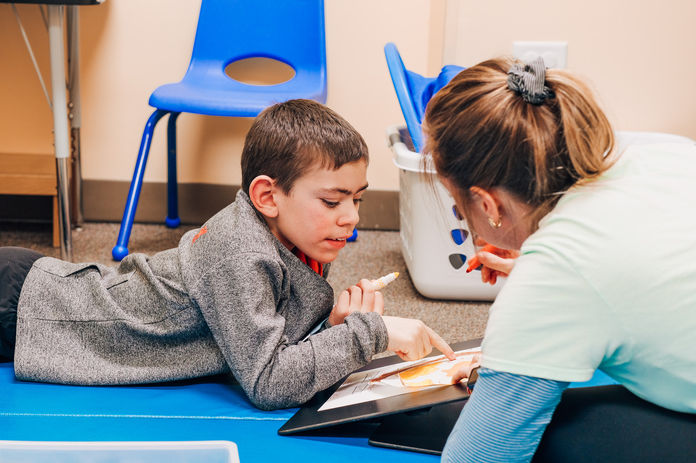Occupational Therapy
Occupational therapy helps improve small (fine) muscle development, movement, and coordination.
Pediatric Occupational Therapy
Pediatric occupational therapy is led by occupational therapists specially trained to treat children of all ages, from birth through young adulthood, who have challenges with everyday activities, including:
Fine motor development and coordination
Using small muscles in the hand, wrists, and fingers for grasping toys and utensils, eating, dressing (zippers, buttons, shoe laces), self-care (bathing, tooth brushing), drawing, writing, cutting and computer skills.
Play and social skills
Difficulty forming friendships and relationships, taking turns during play, playing at age-appropriate levels, creating ideas for play, playing and interacting appropriately with peers.
Sensory processing
Difficulty processing and responding appropriately to sensory information, overly sensitive (can’t tolerate textures of food or clothes), under-responsive (movement seeking, very high pain tolerance), overly emotionally reactive, poor coordination.
Eating and Nutrition
Sensitivity to the taste, texture, smell, color, and temperature of certain foods and entire food groups resulting in a limited diet and nutritional deficiencies.
Visual motor skills
Using eyes and hands in a coordinated manner for letter recognition, drawing, writing, copying from the board, playing games, ball activities and sports.
Kids Can Do Occupational Therapy
At Kids Can Do, occupational therapy begins with a comprehensive evaluation that includes information gathering, testing, and observation. After the evaluation is completed and it is determined that occupational therapy is needed, a customized occupational therapy plan of care is designed based on a child’s unique profile and specific needs.

Our occupational therapists
At Kids Can Do, therapy is administered by fully licensed occupational therapists with advanced degrees. This standard confirms therapy sessions are backed by knowledge and purpose, and ensures on-going monitoring and fine-tuning of the therapy plan. Constantly evaluating the effectiveness of the occupational therapy plan is particularly important when treating the complex and evolving needs of children. Our therapists actively pursue continuing education training, and mentoring. Kids Can Do’s whole-child approach to therapy includes collaboration with additional therapists, families and other care givers.

Learning through purposeful play
Play is the primary occupation of childhood and provides the foundation for learning. Our occupational therapists design therapy sessions so children learn through enjoyable, fun and meaningful activities. At Kids Can Do, therapists are always willing to explain the purpose and strategy of their therapy sessions as well as provide supplemental activities for home.

Hand-in-hand therapies
Through occupational therapy, children can improve their ability to complete everyday tasks with greater ease and independence, leading to decreased stress, anxiety and greater life satisfaction.
Additionally, specially trained occupational therapists can provide therapy designed to treat eating difficulties and sensory processing disorders.



